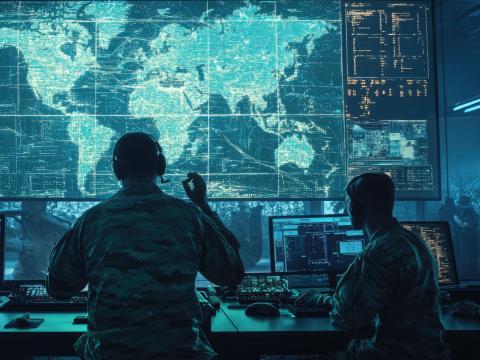United States to Continue Cyber Dialogue With China in July
The United States will continue to develop a bilateral relationship with China regarding cybersecurity issues. In fact, the two countries will meet again in Washington, D.C., on July 8th, according to Maj. Gen. John Davis, USA, senior military advisor to the undersecretary of defense—policy for cyber, Office of the Secretary of Defense. Gen. Davis, the luncheon keynote speaker on the first day of the July 24-27 AFCEA International Cyber Symposium in Baltimore, said the United States recognizes China as a rising power and a major voice in the cyber arena.
High-ranking officials from State Department, Defense Department and other agencies, have been engaged in bilateral, multi-lateral and international forums such as the United Nations and NATO. “As an example, of a critical bilateral relationship, I had the great honor to travel to China twice in the last year and engage as part of a collective U.S. academic and government interagency forum with counterpart Chinese academic and government organizations,” Gen. Davis said.
“U.S. senior government officials across the agencies have been actively engaging their Chinese government counterparts, including the People’s Liberation Army, in a number of ways already, and we would like to see those engagements expand,” Gen. Davis reported. “I had the opportunity to personally encourage a more direct military-to-military relationship with China in a serious effort to help our two nation’s militaries better understand each other, to reduce misconceptions, to reduce misinterpretations and ultimately, to reduce the chance of mistakes that can happen in cyberspace and perhaps spill over into the physical domains.”
He added that the two nations last met in December in Washington, D.C., and will do so again next month. “The Defense Department, along with several of our interagency partners will hold a working group meeting on cyber with our Chinese counterparts to talk about this directly and strive for concrete solutions with actionable steps for progress,” he disclosed.
The general alluded to a fundamental disagreement that the U.S. and its allies have with China and Russia on Internet governance. U.S. officials advocate for applying existing treaties to the cyber domain, while the U.S. and Russia push for drafting new international agreements. The approach favored by China and Russia is widely seen in western nations as a way to exercise greater control over the Internet than other governments do, but the United States and others argue that such an agreement could not be verified or enforced. Existing international laws, including laws of armed conflict and human rights, anticipate technological innovation, Gen. Davis said, adding that “Much work remains to be done in developing a common understanding about how existing rules apply to online conduct, and we will continue to engage in those discussions.”




Comments